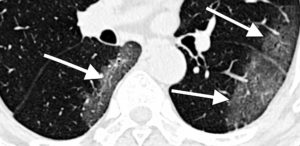
COVID-19 Roundup: AI, Brussels, Climate Change & More

(red_diamond/Shutterstock)
As the COVID-19 pandemic sweeps the globe, big data and AI have emerged as crucial tools for everything from diagnosis and epidemiology to therapeutic and vaccine development. Here, we collect the latest news in how big data is fighting back against COVID-19.
 Brussels hospital manages COVID-19 outbreak using Qlik
Brussels hospital manages COVID-19 outbreak using Qlik
In Belgium, which struggled more than most with COVID-19, analytics came to the rescue. The Brussels University Nursing Centre Brugmann leveraged an analytics platform provided by Qlik to offer a bird’s-eye view of the hospital’s coronavirus status across its ward and facilities, including the number of available staff, patients, beds, and PPE. “By 16 March we were able to test the new system, and two days later it was up and running, and we’ve continued to expand it even further, saving us a great deal of manual work. Without the flexibility and innovative data capabilities offered by Qlik, this process would not have been possible,” said Marc van Treel, director of IT for the center. To read more, click here.
ElToro.com spins up a contact tracing app for COVID-19
Normally, ElToro.com offers an IP targeting solution and anonymous tagging of mobile device IDs. Now, it’s putting those talents to work doing contact tracing for COVID-19. The app, built in conjunction with Red e App, only tracks users where they specify they want to be tracked, allowing what ElToro.com calls a “privacy-safe implementation of GPS.” Users can self-declare diagnoses, symptoms, and more. ElToro.com is targeting this solution at businesses, who could use it for on-site contact tracing without intruding on employees’ movements outside of work. To read more, click here.

CT scan of lungs of COVID-19 patient with areas described by radiologists as resembling grains of ground glass. Credit: RSNA
The NIH harnesses AI for COVID-19 response
The National Institutes of Health (NIH) has launched the Medical Imaging and Data Resource Center (MIDRC), a multi-institutional collaboration that it calls “an ambitious effort that will harness the powers of artificial intelligence, and medical imaging to fight COVID-19.” The MIDRC is aiming to create new tools for physicians to detect COVID-19 early and develop personalized therapies for patients. “This program is particularly exciting because it will give us new ways to rapidly turn scientific findings into practical imaging tools that benefit COVID-19 patients,” said Bruce J. Tromberg, director of the National Institute of Biomedical Imaging and Bioengineering (NIBIB). To read more, click here.
BioSymetrics, Janssen, and Sema4 to use machine learning to predict the onset of COVID-19
Biomedical AI firm BioSymetrics has teamed up with health intelligence firm Sema4 and Janssen Pharmaceuticals to apply machine learning for prediction of COVID-19 onset. The collaboration will use BioSymetrics’ Contingent-AI engine to “characterize high-risk populations, measure and predict disease progression based on biological risk factors and treatment course, and identify markers for clinical phenotype and severity of disease.” Beyond predicting disease onset, the collaboration will also engage in other projects aimed at vaccine development and treatment. To read more, click here.
McMaster University uses Pure Storage in the fight against COVID-19
The McArthur lab at McMaster University is aiming to accelerate decision-making in the face of pandemic threats – and now, it’s being enhanced by Pure Storage. The lab is using Pure Storage’s FlashBlade, a unified fast file and object storage platform, to handle “highly complex processes associated with massive genomic datasets.” “There’s no point in playing with traditional storage because it’s just not fast enough,” said Andrew McArthur, head of the McArthur lab. “With Pure Storage we can stay ahead of the curve as we fight global threats to human health.” To read more, click here.
 KT develops AI-based COVID-19 research
KT develops AI-based COVID-19 research
South Korean telecommunications firm KT Corp. is developing a COVID-19 risk assessment model using AI and big data-based digital contact tracing. The effort is supported by the Research Investment for Global Health Technology (RIGHT) Fund. “KT’s new project will help combat the pandemic globally,” said Kim Chae-Hee, head of KT’s AI/big data division. “We at KT will do our best to help prevent COVID-19 from further spreading and raise the efficacy of medical service, using our AI and Big Data technologies for the sake of humanity.” To read more, click here.
Mobility data illuminates climate change pathways for a post-COVID-19 world
The pandemic has slowed human activity, causing a relatively sharp drop in greenhouse gas emissions around the world. Piers Forster, director of the Priestley International Centre for Climate at Leeds, and his daughter examined anonymized smartphone mobility data to explore how long those reductions are likely to last. The duo, in conjunction with other researchers, found that the reductions were unlikely to last past the pandemic and recommended courses of action for ensuring a more sustained reduction. To read more, click here.
Do you know about big data applications for COVID-19 that should be featured on this list? If so, send us an email at [email protected]. We look forward to hearing from you.






























